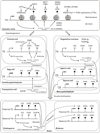Epigenetic reprogramming in plant and animal development
- PMID: 21030646
- PMCID: PMC2989926
- DOI: 10.1126/science.1190614
Epigenetic reprogramming in plant and animal development
Abstract
Epigenetic modifications of the genome are generally stable in somatic cells of multicellular organisms. In germ cells and early embryos, however, epigenetic reprogramming occurs on a genome-wide scale, which includes demethylation of DNA and remodeling of histones and their modifications. The mechanisms of genome-wide erasure of DNA methylation, which involve modifications to 5-methylcytosine and DNA repair, are being unraveled. Epigenetic reprogramming has important roles in imprinting, the natural as well as experimental acquisition of totipotency and pluripotency, control of transposons, and epigenetic inheritance across generations. Small RNAs and the inheritance of histone marks may also contribute to epigenetic inheritance and reprogramming. Reprogramming occurs in flowering plants and in mammals, and the similarities and differences illuminate developmental and reproductive strategies.
Figures


References
-
- Feng S, et al. Proc Natl Acad Sci U S A. 2010 May 11;107:8689.
-
- Zemach A, McDaniel IE, Silva P, Zilberman D. Science. 2010 May 14;328:916. - PubMed
Publication types
MeSH terms
Substances
Grants and funding
LinkOut - more resources
Full Text Sources

